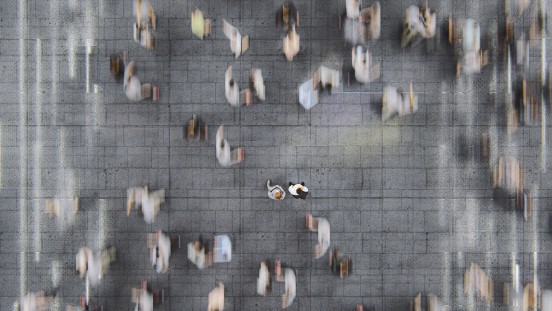Significant modern slavery compensation award
Freshfields secures substantial criminal injuries compensation for modern slavery survivor
Freshfields represented a survivor of modern slavery in a successful appeal to the First-tier Tribunal (Social Entitlement Chamber) of a decision of the Criminal Injuries Compensation Authority (CICA) in December 2023. The appeal resulted in one of the largest UK criminal injuries compensation awards for a modern slavery survivor.
In 2017, nine members of a family (the Rooney family) were convicted of modern slavery offences following Lincolnshire Police’s “Operation Pottery” investigation. The convictions were reported as being one of the most severe cases of modern slavery ever uncovered in England and Wales.
26 years of slavery
One of the longest-standing survivors of the Rooney family’s modern slavery offences was Mr A (who later went on to instruct Freshfields in a challenge to the CICA’s decision to refuse him compensation).
During Mr A’s period of enslavement with the Rooney family, he was subjected to repeated assaults, violent threats and forced labour for over two-and-a-half decades. Mr A was severely exploited, abused and made to live in squalid conditions – he was reportedly subjected to numerous threats and acts of violence as a means for the Rooney family to intimidate Mr A and other victims.
As a result of this ongoing and inhumane treatment, Mr A sustained many physical and psychological injuries including brain damage, post-traumatic stress disorder (due to persistent mental and emotional abuse), as well as extensive physical injuries including a fractured ankle, loss of teeth, numerous head injuries and other physical scarring.
Mr A was one of several survivors rescued by Lincolnshire Police in 2014 and was reunited with his family the following year. To date, the Rooney family’s victims have not been fully compensated despite various proceedings and court orders which have been made and pursued under the Proceeds of Crime Act 2002.
Refused compensation
In 2017, after being reunited with his family, Mr A applied for compensation from the CICA which is a public body that compensates victims of violent crimes in Great Britain. Because applications to CICA on behalf of trafficking survivors are not within scope for legal aid, Mr A had made his application without the benefit of legal advice and assistance. In 2020 the application was rejected, which is when the charity Anti Trafficking and Labour Exploitation Unit (ATLEU) referred Mr A’s case to Freshfields for pro bono representation.
Freshfields went on to represent Mr A on a pro bono basis, requesting a review of the decision in the first instance. The review resulted in a nominal offer of £2,000 in compensation (reduced to £1,600 due to an unspent criminal conviction).
On Freshfields’ advice, Mr A appealed the CICA’s review decision to the relevant chamber of the First-Tier Tribunal. The team filed a 2,000-page bundle of witness statement evidence, legal submissions, neurologist, care and psychologist expert reports and a schedule of loss.
One of the highest UK modern slavery compensation awards
The Tribunal awarded Mr A over £350,000 (with no reduction in respect of any convictions). The award compensates Mr A for all his injuries and his past and future loss of earnings resulting from that. The award also represents one of the highest amounts of compensation to have been awarded to a survivor of modern slavery by a court or tribunal in the UK.
Mr A’s case highlights how the criminal injuries compensation scheme does not neatly, nor consistently, cater for survivors of modern slavery and human trafficking. It was intended to be accessible to members of the public without the need for legal representation, but Mr A’s case illustrates how inaccessible the scheme can be for litigants in person who do want to secure a fair level of compensation to which they are legally entitled.
Jamila Duncan-Bosu, Solicitor at ATLEU, which referred Mr A’s case to Freshfields, said: “For many survivors of trafficking and modern slavery, an application to the Criminal Injuries Compensation Authority for compensation is the only route to obtain compensation. Such compensation can be life-changing for survivors, providing them with the financial ability to help rebuild their lives and reduce their risk of being re-exploited (which can otherwise happen) through greater access to necessary care and support.”
Freshfields Associate Liam Symonds, who led the case along with former Senior Associate Vanessa Medina, commented that: “We hope that features of the Tribunal’s decision in this case, although not legally binding on future decisions, will enable other survivors of modern slavery and human trafficking to obtain fairer criminal injuries compensation awards.”
Christopher Stothers, Partner, added that: “We are very pleased to have been able to play a part in our client’s pursuit for justice following the violent and exploitative treatment that he had suffered over such a long period of time. The team has worked excellently over the last four years to formulate cogent legal analysis in respect of the relevant legal provisions, procure expert medical and care evidence, as well as gathering complex witness and documentary evidence covering a period of over 50 years.”
BBC coverage of this case can be found here. Further information on this case, including for criminal injuries compensation practitioners, can be found here.
The Freshfields team comprised Partner Christopher Stothers, Associate Liam Symonds, Trainee Solicitor Wannisa Johnston, Legal Solutions Specialist Adil Khan, former Senior Associate Vanessa Medina and former Paralegal Hannah Vo. The team instructed James Robottom of Matrix Chambers.
How we helped
Our team
-

Christopher Stothers 合伙人
London, Dublin
-

Liam Symonds 律师
Manchester, London



